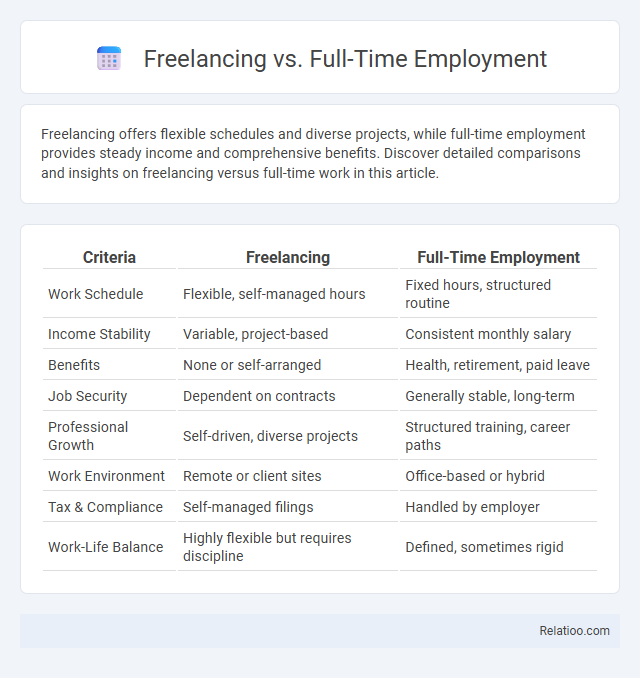Freelancing offers flexible schedules and diverse projects, while full-time employment provides steady income and comprehensive benefits. Discover detailed comparisons and insights on freelancing versus full-time work in this article.
Table of Comparison
| Criteria | Freelancing | Full-Time Employment |
|---|---|---|
| Work Schedule | Flexible, self-managed hours | Fixed hours, structured routine |
| Income Stability | Variable, project-based | Consistent monthly salary |
| Benefits | None or self-arranged | Health, retirement, paid leave |
| Job Security | Dependent on contracts | Generally stable, long-term |
| Professional Growth | Self-driven, diverse projects | Structured training, career paths |
| Work Environment | Remote or client sites | Office-based or hybrid |
| Tax & Compliance | Self-managed filings | Handled by employer |
| Work-Life Balance | Highly flexible but requires discipline | Defined, sometimes rigid |
Overview of Freelancing and Full-Time Employment
Freelancing offers flexibility, allowing you to choose projects and set your own schedule, which can lead to varied income based on workload and client demand. Full-time employment provides a steady paycheck, benefits such as health insurance and retirement plans, and typically includes structured work hours and career advancement opportunities. Understanding these core differences helps you evaluate which work style aligns best with your financial stability and personal freedom goals.
Flexibility and Work-Life Balance Comparison
Freelancing offers unmatched flexibility by allowing professionals to set their own schedules, choose projects, and work from virtually anywhere, significantly enhancing work-life balance. Full-time employment often provides structured hours, team collaboration, and job security but can limit flexibility and personal time due to fixed schedules and commuting commitments. Lifestyle changes, such as remote work or part-time roles, blend elements of both models, aiming to optimize work-life balance by adjusting daily routines without sacrificing steady income or professional growth.
Income Stability: Pros and Cons
Freelancing offers flexible income potential but often lacks the predictable paycheck and benefits associated with full-time employment, making financial planning more challenging. Full-time employment provides stable monthly income and benefits such as health insurance and retirement plans, yet it may limit earning potential and personal freedom. Lifestyle changes that prioritize work-life balance can reduce income but enhance overall well-being, requiring careful assessment of personal financial resilience and priorities.
Career Growth Opportunities
Freelancing offers diverse projects that enhance skill development and allow you to build a varied portfolio, accelerating your career growth through practical experience. Full-time employment provides structured training, mentorship, and clear promotion paths, supporting steady advancement within a specific industry or company. Lifestyle changes, such as pursuing entrepreneurship or remote work, can create unique career opportunities by aligning personal values with professional goals, fostering long-term satisfaction and growth.
Job Security: Which Is More Stable?
Full-time employment offers the highest job security through steady income, employer benefits, and legal protections such as unemployment insurance and retirement plans. Freelancing provides greater flexibility but comes with income variability, lack of benefits, and reliance on client acquisition, making job stability less predictable. Lifestyle changes that shift work patterns or industries may impact job security depending on market demand, skill adaptability, and economic conditions, requiring proactive career management.
Benefits and Perks Analysis
Freelancing offers flexibility, autonomy, and diverse project opportunities, allowing professionals to tailor their work-life balance and increase income potential. Full-time employment provides stability, consistent benefits like health insurance, retirement plans, and paid leave, ensuring financial security and career growth through structured roles. Lifestyle changes emphasize wellness, reduced stress, and personal fulfillment, often integrating remote work or entrepreneurship to enhance overall quality of life while balancing professional ambitions.
Work Environment and Culture
Freelancing offers a flexible work environment with diverse client interactions and self-directed schedules, fostering independence but often lacking structured team culture. Full-time employment provides a stable workplace culture with consistent collaboration, defined roles, and organizational support, promoting career growth and social interaction. Lifestyle changes, such as remote work or digital nomadism, redefine traditional work environments by blending personal freedom with professional responsibilities, emphasizing adaptability and work-life balance.
Skills Development and Learning
Freelancing offers You the flexibility to rapidly diversify skill sets by working on varied projects across different industries, enhancing adaptability and specialized expertise. Full-time employment provides structured learning environments with access to mentorship, formal training programs, and consistent skill development pathways that support long-term career growth. Lifestyle changes, like dedicating time for self-study or online courses, empower continuous learning at Your own pace, fostering personal skill advancement beyond traditional work settings.
Taxes and Financial Planning
Freelancers face variable tax obligations, including self-employment tax, requiring meticulous quarterly estimated tax payments and advanced income tracking unlike full-time employees who benefit from employer withholding and predictable deductions. Full-time employment often offers structured benefits like retirement plans and health insurance, simplifying long-term financial planning compared to freelancers who must independently manage these expenses and savings. A lifestyle change towards freelancing demands rigorous budgeting and tax planning to accommodate fluctuating income and ensure financial stability, emphasizing the importance of emergency funds and diversified income streams.
Choosing the Right Path for You
Evaluating freelancing, full-time employment, and lifestyle changes requires assessing personal priorities such as flexibility, financial stability, and work-life balance. Freelancing offers autonomy and diverse project opportunities but may lack consistent income and benefits, whereas full-time employment provides steady salary and structured career growth. Aligning your decision with long-term goals and mental well-being ensures the right path supports both professional success and personal fulfillment.

Infographic: Freelancing vs Full-Time Employment
 relatioo.com
relatioo.com